Hearts of Iron 4: Diplomatic actions
Last update:
Foreign policy in Hearts of Iron IV is one of the factors that determines your success, during a global conflict. Unfortunately, it is not too extensive and therefore, you can notice various shortcomings of the system. Thanks to diplomatic relations, you strengthen your position from the perspective of the globe, by undertaking specific actions and forming alliances. Taking appropriate diplomatic actions allows you to avoid premature conflicts with the stronger nations and ensures you with general success on your path to world domination.
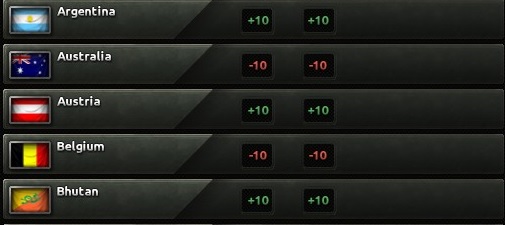
As you can notice, in the above screenshot, after you access the diplomacy panel, a list of nation is displayed and you can view your nation's attitude towards the rest of the nations, and vice versa. However, there is a minor shortcoming, when it comes to this panel. The coefficient reflects only the effectiveness of trade agreements. At the same time, value of this coefficient, for the actions discussed later in this guide is negligible.
Even if opinions of the countries are high, this does not guarantee success of individual actions, because the majority of them are based on completely different modifiers, which will also be discussed for each one of them. What is important is that the effect of certain factors may disappear with growing of attractiveness of certain offers for a country. Even if a nation does not like you too much, they will not reject your help, or access to your territory, in wartime.
One of the restrictions mentioned above is the fact that you cannot directly affect development of this type of situations. All of the actions are decided by either the computer's or the other players' actions and there is no way for you to bring about the collapse of a faction or escalation of conflict between individual countries. As a result, throughout the entire game, you can only observe political moves of others and wait for the right moment to strike.
One of the factors that saves this aspect of the game is the option to propagate your own political system in other countries. Thanks to this, you can bring closer, in ideological terms, those of the countries that have not been interested earlier in your model of a nation. In a longer run, you can enter a coalition with such countries, but you will have to wait long, before such offer becomes advantageous for one of the AI- controlled nations. In reality, this means that you can join the nations of the Axis, the Alliance or Komintern,. In each of the situations, you have to take into account which countries you are neighboring and relations of power between individual nations.
Below, you can view information connected with each of the available diplomatic actions.
- Justification of war goal
- War
- Guarantee of independence
- Military access
- Improve relations
- Non-aggression pact
- Faction
- Military reinforcement
- Volunteers
- Ideological popularity
- Coup
Justification of war goal
This is the first step to take in the case of any conflict. Before you take military action, you have to relate to the territory that you want to attack.
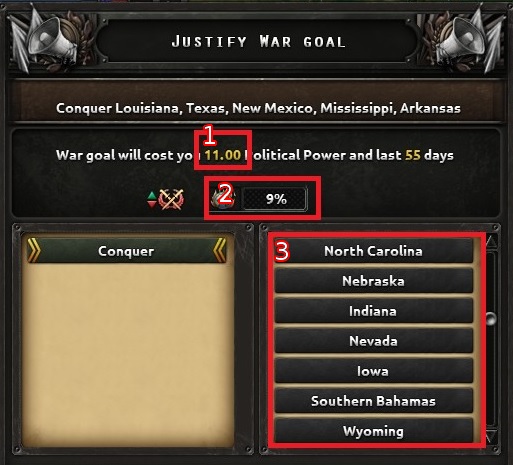
The above screenshot presents the window of war goal justification. You can declare a war by relating to your claims to, up to, five regions [3]. Also, you can present your claims for fewer regions and then, the political power cost [1] will be lower. After you start the justification process, you can wait for a certain number of days that will allow for an effective media campaign against the nation that you want to conquer. Of course, justification of your war goal generates global unrest, whose value [2] on how powerful is the nation that you want to invade.
Remember that you require a specific number of political power to start the process. After the allotted time has elapsed, your war goal will become justified and you can move on to the next chapter.
War
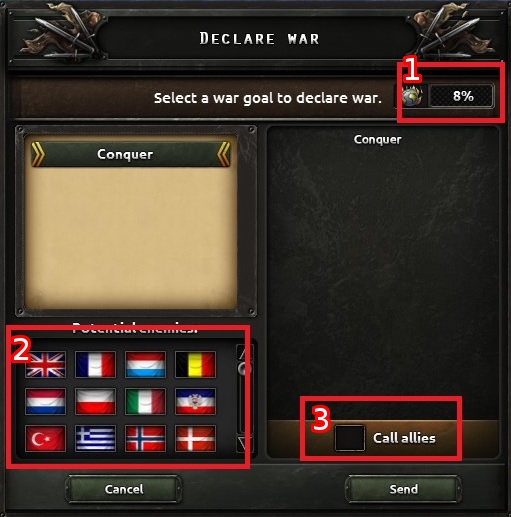
As soon as your war goal becomes justified, you can declare a war. Open conflict with another nation results in increased global unrest [1] and it affects other countries' disposition towards you. You should remember about that, because some of the countries, especially the democratic ones, frown at the nations that incite global unrest and in the course of the game, you can find out that a single war at the beginning of the game disables majority of diplomatic actions with individual countries, for the rest of the scenario.
The above screenshot presents war declaring window. The window lists potential opponents [2] whose aggression you have to take into account, while declaring the war. Usually, these are countries from the same faction, or ones that guaranteed independence to the country you are about to attack.
While declaring a war, you can ask your allies' participation [3]. IF you do not check this option in the above window, you can do this later on in the diplomacy window for individual countries.
Before you declare a war, check out how strong is the faction that the country belongs to, and whether it has guarantee of independence granted by another nation. Assess your chances and try to find allies.
Guarantee of independence
Granting the independence of another nation means that in the case of war, you can intervene in defense of territory of that country. The guarantee considerably increases opinion of that country on your nation and it can be a useful tool in entering alliances. Cost of a single guarantee starts at 25 political power points and it grows by 25 per each guarantee that you make. Of course, you can retract your guarantee at any moment, but you have to keep in mind that the cost is 25 political power points, which is why you should consider whether this is a good move.
If you have secured guarantee of independence for a country, you should intervene whenever the country faces war. A typical example of intervention policy is the USA, which guarantees independence of all countries of Latin and South Americas.
Note: In this case, you can slightly bend the rules to you needs. If a country that you are at war with has a guarantee of another country, two things can happen:
1. The invaded country calls for its protector and automatically, you will end up waging war against both countries.
2. IF the country does not call for its protector immediately, after a while, you will receive a threat that war will be waged against you, if only you do not withdraw your forces. In such a situation, you can ignore the note and do nothing about it. If you are convinced that you win, wait for your countries to conquer the country. When this happens, peace talks window pops up. Pick the option to claim the enemy country and end the talks. Just remember not to click any option on the note. After the talks end, with the country included into your territory, you can click on the note to "withdraw your forces". This way, you will avoid war with the protector and, at the same time, you will seize the territory of another nation.
Military access
You receive access
The chances for this to succeed are very low. The majority of nations will provide you with excuses for which they can refuse to let your armies cross their territory and they do not grant you access to their military bases. This type of actions can only be effective with allied nations, but not always, though.
You grant access
Basically, there are no reasons, for which you should agree on that. Nations that are at war will gladly take advantage of such offer and transfer some of their armies to your territory. You can take advantage of that to improve your relations, but this will not mean much.
Improve relations
Improving relations will boost the coefficient of other nation's opinion about you, by up to 100 points, in a relatively short time. Remember that you have to watch this change closely, because after the maximum value is reached, the procedure will end and the value will start to drop by 3 points a day. Improvement of relations, in connection with other modifiers, can encourage a neutral nation to enter a profitable relation with you.
The cost to stat the procedure is 10 political power points. For the duration of the process, you will be receiving lower income of political power. Daily cost of the process is 0.2 points for countries with the same ideology and 0.4 for nation with a different ideology. Also, it should be noted that even improving relations with a country of a different ideology, to the maximum level, is not going to help you too much, because that country will be using another negative modifier, even to the level of -150 points.
Non-aggression pact
This is a tool that you can use to ensure yourself with relative , when it comes to contacts with your neighbors. Of course, for this act to be in power, it is necessary to maintain positive relations. You can notice that the majority of powers will send you such an offer in a situation, in which you declare a war on a faction hostile to them. Of course, you will receive such an offer on condition that you do not belong to the same factions as the powers themselves.
Pact can be revoked for the duration of one year of signing. After one year elapses, it is possible to revoke the pact under certain conditions:
Duration | Condition |
13-18 months | you have, at least, 200% of divisions along your shared border. |
19-24 months | you have, at least, 100% of divisions along your shared border |
25-30 months | you have, at least, 50% of divisions along your shared border |
Solutions provided by the game here are quite poor, because the majority of countries will not sign the pact, basing on the modifier of your mutual dislike, which you will, most likely, be unable to exceed. You can only accept offers from other countries.
Faction
Faction is the only way to enter a lasting alliance. You have to keep in mind that wars waged by members of factions take effect on the remaining nations. IF you decide to join a faction, you have to take aggression of its enemies into account. Remember, if you want to conquer enemy territories, nations that belong to no faction are a much better target. Of course, It is possible that the country that you have declared war on will ask for help of other countries and will agree to enter their faction. At this point, there is no other way and you will be at war with the entire faction.
Using the faction, you can dispatch voluntary forces and Expeditionary forces. Apart from that, you can ask for help with wars that you are currently waging and you can gain access to borders and naval bases of your allies.
Establishing a faction is not an easy task. I requires you to meet certain requirements. The most important one is ideological unity. Thanks to this, you can avoid the key negative modifier. Apart from that, each of the countries will earlier agree to enter an alliance if you, or that country, are at war. It should be pointed out that each country managed by the AI will be more lenient towards you, due to the fact that you are the player. Thanks to this, you often receive a positive modifier, which often tips the scales to your advantage.
Military reinforcement
Expeditionary forces
Depending on the political system in your country, and your political goals that you, you can dispatch Expeditionary forces. You can do this after you meet three requirements:
- the country that accepts the forces has to be in the same faction as you
- the country that accepts the forces has to be at war
- you have to declare war on countries that your ally is at war with
Expeditionary forces will fight hand in hand with your ally, the conquered territory will be divided and included into your territory. Note the fact that after you send the forces, you lose control over them and regain it only after you withdraw them from the allied army.
Lend Lease
It is also possible to lend military gear to another nation that is at war. You can lend any type of gear that you own and which you do not need to form another division from the logistic viewpoint. In the panel, you can define what type of gear you want to borrow and in what quantities.
Thanks to the lease, you can support one of the sides of the conflict, and by direct participation, you can receive army experience points that you can use to reorganize your division templates.
Volunteers
Thanks to your diplomatic actions, you can receive and dispatch volunteers to other countries. Note that your diplomatic relations with that country, or within the alliance, do not have to be that good to be able to exchange volunteers. The key condition is that the country that dispatches volunteers cannot be at war and the country to receive them is at war. Thanks to volunteers, you can back another country without getting involved in a conflict.
Divisions that you receive are stationed on your territory, but they are not subject to your jurisdiction. In general, they form the core of several regions and they are especially useful for defensive actions. You cannot give them orders and you cannot relieve them from duty. Your decisions in this respect are limited to decision about whether you accept or refuse them. This option still needs polishing up, but you can always accept them to reinforce positions that you want to defend.
Ideological popularity
This is one of the most interesting diplomatic options in the game. Thanks to it, you can call on people directly to change their political ideology. As a nation of a defined ideology, you can propagate your model. As a country without ties, you can exhort others to accept your political system, depending on support that is of key importance.
This way, you can create potential allies. This process is time-consuming because many factors depend on its success. Still, it suffices to devote enough time to it and you will reach your goals.
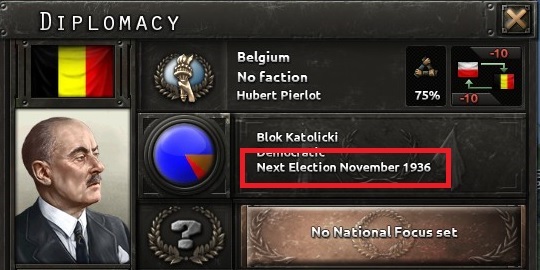
Before you start such an action, check out some important information. First, define, on the pie chart, what is the support for the system that you want to introduce. Check out daily fluctuations in support for that country, and when the next election is supposed to take place.
If, before election is announced, support for the ideology reaches 51%, after the election takes place, the country will accept that system. You have to keep in mind that growing popularity of an ideology may lead to social rifts and civil war. In such a situation, the country will break up into two separate nations that will fight between each other over which political system to introduce. Which system will be introduced depends on which nation wins the war, and election will not be held in that country until the end of the game.
Coup
This option is especially useful when you want to destabilize situation in a country. It is best to start staging a coup by propagating own ideology. Thanks to this, opposition forces will be able to deploy more soldiers, which may have a direct effect on the success of the separatist nation.
It should be noted that organizing a coup involves certain costs. You have to devote a portion of your daily income of political power to organizing the coup and additionally, some of your military gear will have to be set aside for the purposes of the imminent civil war.
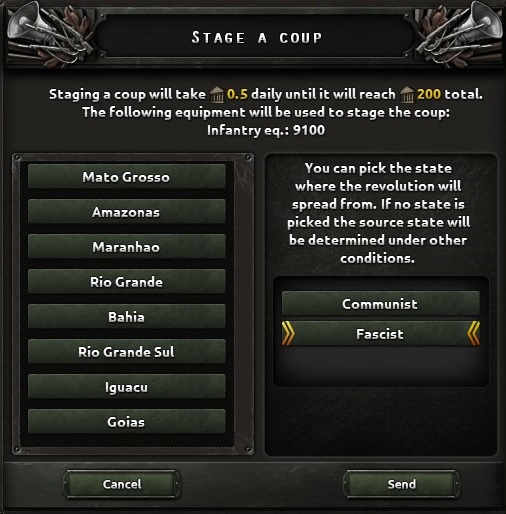
During your preparations, you can pick the ideology in the name of which the coup will be staged, as well as regions that are supposed to initiate the war. The amount of gear that you will have to amass will differ, depending on the provinces you pick.
Coup always results in escalating ideological policy in the country. Regardless of which side wins, popular elections will be delegalized in the country and daily income of support for the opposing ideology will drop. Always consider whether it is better to stage a coup, or to wait for the next election, where you will be sure that the country's ideology will actually change.
During civil war, you can always join separatists and establish a faction with them. Also, you can declare war on the country, thanks to which you will have it fight on both fronts. If you fight within a faction, all spoils of war will be received by the separatists, whereas, if you decide to declare war, you will receive all the seized territories.
You are not permitted to copy any image, text or info from this page. This site is not associated with and/or endorsed by the developers and the publishers. All logos and images are copyrighted by their respective owners.
Copyright © 2000 - 2025 Webedia Polska SA for gamepressure.com, unofficial game guides, walkthroughs, secrets, game tips, maps & strategies for top games.
